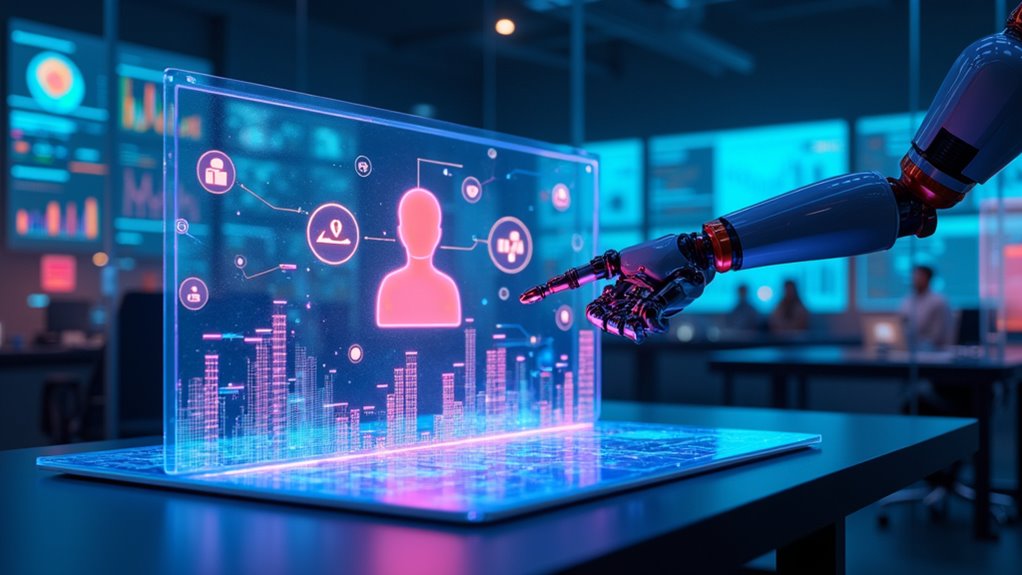AI transforms modern marketing by revolutionizing how businesses connect with consumers. Predictive analytics now anticipate customer needs before they even arise, while personalization engines craft individual experiences at scale. Gone are the days of spray-and-pray campaigns—today’s AI tools analyze terabytes of data instantly, optimize content, and automate tedious tasks. Smart marketers leverage these capabilities while respecting ethical boundaries and privacy concerns. The marketing landscape has fundamentally shifted, and those who adapt will discover competitive advantages their predecessors never imagined.

Artificial intelligence has revolutionized the marketing landscape, transforming how businesses connect with consumers in ways unimaginable just a decade ago. This technological shift brings both immense opportunities and serious concerns around AI Ethics and Consumer Privacy. While marketers gleefully collect mountains of data, they must navigate increasingly complex regulations that protect consumer information. Data Security isn’t just a buzzword anymore—it’s a business imperative.
Marketing Automation tools might make your life easier, but they also demand responsible governance. Remember, just because you can automate everything doesn’t mean you should. Personalized email campaigns triggered by specific customer purchasing patterns have replaced ineffective mass emails, significantly improving marketing relevance.
Powerful automation requires powerful responsibility—wield your marketing tech stack with ethical intention and purpose.
AI-powered analytics have fundamentally changed decision-making processes. Gone are the days of educated guesses and gut feelings. Today’s marketers wield predictive analytics to anticipate consumer needs before consumers themselves know what they want. These systems sift through terabytes of data in seconds, identifying patterns humans would miss in a lifetime. Recent studies show that adoption rates have reached 60-70% among major companies implementing AI in their advertising strategies.
Customer segmentation has evolved from basic demographics to intricate behavioral models that track digital footprints across platforms. Want to know what your competitors are up to? AI tools analyze their every move.
Perhaps nowhere is AI’s impact more visible than in personalization. Those product recommendations that somehow know exactly what you need? That’s AI working behind the scenes. Recommendation engines drive significant revenue increases by showing consumers items they’re likely to purchase. The dramatic tenfold increase in AI use among the public in 2023 has further accelerated personalized marketing approaches.
Chatbots now handle customer queries 24/7, providing instant responses that feel surprisingly human. Sentiment analysis tools monitor social media mentions, allowing brands to address negative feedback before it spreads.
Content creation, once purely human territory, has been transformed by AI assistants that generate blog posts, ads, and social media content in seconds. SEO optimization tools predict which keywords will drive traffic tomorrow, not just today.
Video creation, email personalization, and multilingual content—all supercharged by artificial intelligence. The result? Marketing departments accomplishing more with fewer resources, delivering highly targeted messages that resonate with individual consumers rather than broad audiences.
Frequently Asked Questions
How Much Does Implementing AI in Marketing Typically Cost?
Implementing AI in marketing costs vary dramatically based on complexity.
Basic AI marketing tools run $0-$25,000 annually, while custom solutions can skyrocket to $500,000+.
AI budgeting requires careful cost analysis of both initial investment and ongoing expenses like cloud computing ($99-$1,500 monthly) and talent ($100K-$300K annually).
Companies must weigh these factors against potential ROI—automation reduces errors while boosting efficiency.
Can Small Businesses Effectively Use AI for Marketing?
Yes, small businesses can absolutely leverage AI tools for marketing with impressive results.
Today’s cost-effective solutions level the playing field, allowing even modest operations to implement sophisticated data analysis for customer engagement.
AI-powered marketing strategies deliver personalization without enterprise-level budgets.
The numbers don’t lie – automation can boost productivity by 40% while cutting operational costs by 30%.
For small businesses feeling outgunned by larger competitors, AI offers a practical path to competitive marketing without breaking the bank.
What Privacy Concerns Arise When Using AI in Marketing?
When using AI in marketing, privacy concerns lurk around every algorithmic corner.
Data security becomes a major headache as AI systems collect massive amounts of personal information—often without proper safeguards. Consumer consent isn’t just nice-to-have, it’s legally required! Companies frequently fail to obtain clear permission before analyzing shopping habits or serving personalized ads.
Other worries include algorithmic bias, regulatory compliance issues, and the potential misuse of sensitive data. Regular audits and transparent policies? Absolutely essential.
How Long Does AI Marketing Implementation Usually Take?
AI marketing implementation timelines vary widely—from 3-6 months for basic systems to over a year for enterprise-level solutions.
Companies face integration challenges when connecting AI tools with existing tech stacks, often underestimating the complexity. Data quality issues? They’ll slow you down every time.
The implementation process typically includes assessment, tool selection, team training, and phased rollout.
Are There Specific Industries Where AI Marketing Doesn’t Work Well?
AI marketing faces efficacy challenges in several sectors.
Arts and entertainment industries struggle with AI’s creative limitations, while healthcare marketing must navigate regulatory minefields.
Financial services? Data privacy concerns make implementation tricky.
B2B sectors often find AI falls short with complex decision-making processes.
Non-profits and social causes typically need the human touch that AI simply can’t replicate.
The limitations aren’t insurmountable, but some industries definitely require more human oversight than others.









